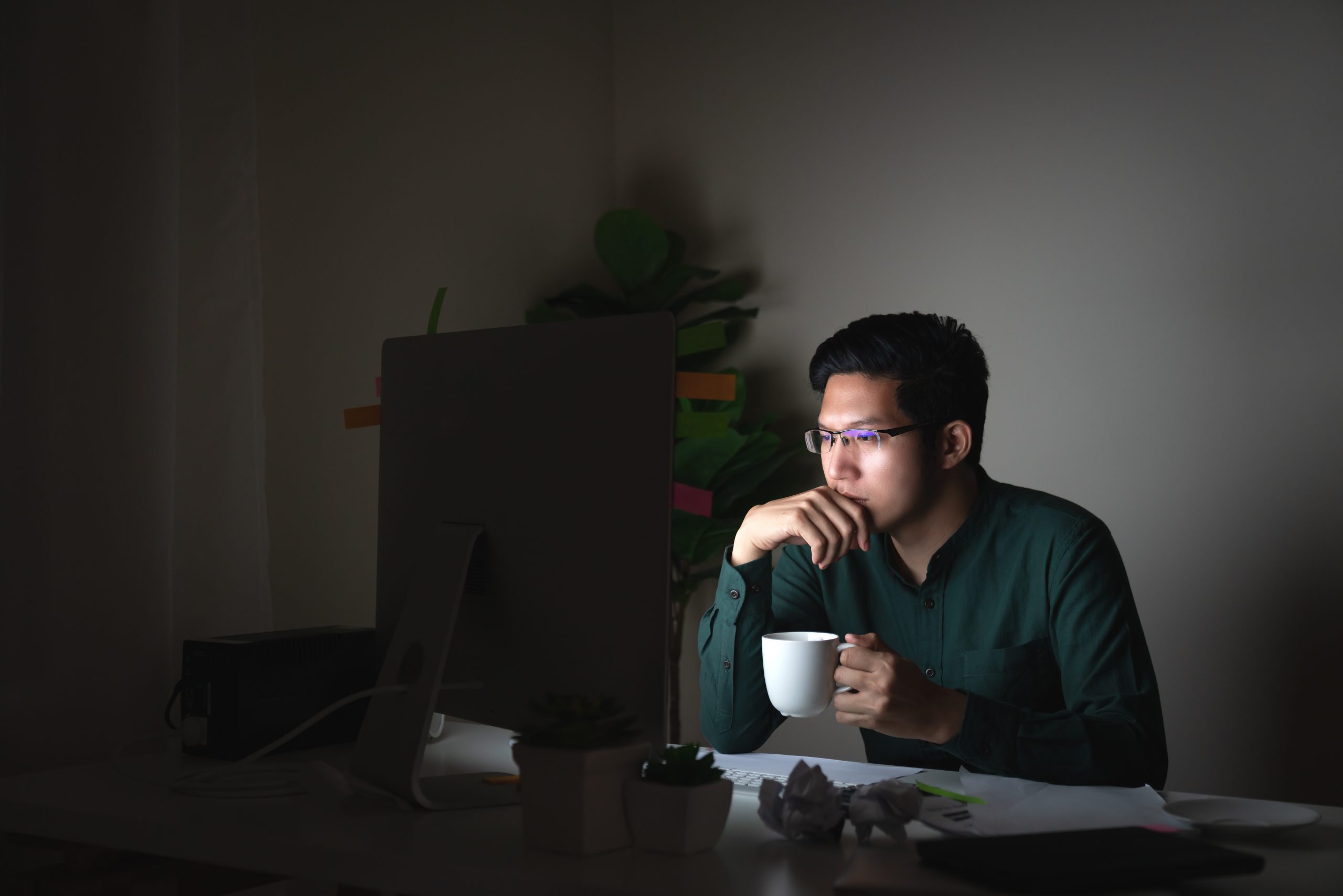We all know that being a proficient trial attorney is a notoriously demanding job. To serve our clients well, we need to be mentally sharp all day long. Are we doing all we can to be at our best? Today’s topic: How well are you sleeping?
The Mayo Clinic tells us that adults need “7 or more” hours of sleep per night, yet Gallup tells us that only 59% of American Adults get adequate sleep. Many attorneys have adopted the view that they simply don’t have time to sleep. It’s a habit many of us learned in law school. Many of us have become convinced that it as a badge of honor to work late into the night, then wake up early and grind through the next day. Many of us have done this for decades. It’s difficult enough to get enough “Z’s” to do our jobs, but many of us have many other demands, including trying to spend time with our families.
Again, who has time to sleep? There’s simply too much work to do. This is a daunting problem. There are mountains of work to dig through and sleep is extraordinarily greedy, robbing us of a staggering number of lifetime hours, 25-30 years out of a typical life.
Yes, increasing our sleep shortens that precious part of the day where we are conscious, but research shows that high-quality sleep also showers us with benefits. In 2017, Matthew Walker, PhD authored a bestseller, Why We Sleep: Unlocking the Power of Sleep and Dreams. Holloway has written a page-turner, not a book that will put you to sleep. This book is about you (and all of the rest of us). First, the bad news:
Routinely sleeping less than six hours a night weakens your immune system, substantially increasing your risk of certain forms of cancer. Insufficient sleep appears to be a key lifestyle factor linked to your risk of developing Alzheimer’s disease. Inadequate sleep—even moderate reductions for just one week—disrupts blood sugar levels so profoundly that you would be classified as pre-diabetic. Short sleeping increases the likelihood of your coronary arteries becoming blocked and brittle, setting you on a path toward cardiovascular disease, stroke, and congestive heart failure. . . Perhaps you have also noticed a desire to eat more when you’re tired? This is no coincidence. Too little sleep swells concentrations of a hormone that makes you feel hungry while suppressing a companion hormone that otherwise signals food satisfaction. being full, you still want to eat more. It’s a proven recipe for weight gain in sleep-deficient adults and children alike.
Holloway notes that humans are the only animals that will “deliberately deprive themselves of sleep without legitimate gain.” We also seem to be the only species that deprives itself of sleep in order to watch cat videos. The countries where hours of sleep have declined the most (including the US, UK and Japan) are suffering the worst from the above physical and mental maladies. Holloway further notes that traffic accidents caused by lack of sleep kill one person every hour in the U.S.
Most of Holloway’s book focuses on why we sleep, and it’s a fascinating story that inter-weaves biology, natural selection and culture. Fun fact: humans sleep far less than any of the other primates, which sleep between 10-15 hours per day.
How important is sleep? According to Holloway, “There does not seem to be one major organ within the body, or process within the brain, that isn’t optimally enhanced by sleep (and detrimentally impaired when we don’t get enough).” Holloway offers a long list of benefits, starting upstairs:
Within the brain, sleep enriches a diversity of functions, including our ability to learn, memorize, and make logical decisions and choices. Benevolently servicing our psychological health, sleep recalibrates our emotional brain circuits, allowing us to navigate next-day social and psychological challenges with cool-headed composure.
Sleep offers many additional benefits from the neck down:
Downstairs in the body, sleep restocks the armory of our immune system, preventing infection and warding off all manner of sickness. Sleep reforms the body’s metabolic state by fine-tuning the balance of insulin and circulating glucose. Sleep further regulates our appetite, helping control body weight through healthy food selection rather than rash impulsivity. Plentiful sleep maintains a flourishing microbiome within your gut from which we know so much of our nutritional health begins. Adequate sleep is intimately tied to the fitness of our cardiovascular system, lowering blood pressure while helping keep our hearts in fine condition.
Here are a few more things to consider:
40% of us are “larks,” preferring to wake up at down, while 30% of us are “owls,” refusing to give up the night. Holloway points to research showing that these two “chronotypes” are often biologically based and difficult to change. The owls often suffer socially, even if they put in the same amount of work during the day—staying up late, then waking late is often portrayed as a form of laziness.
Caffeine is the “only addictive substance that we readily give to our children and teens.” It has a half-life of five to seven hours. If you drink a cup of coffee at 5pm, half of the caffeine is still quite active in your body at 10pm. Some people don’t realize that decaf is not caffeine-free. It typically has 3-10% of the caffeine as regular coffee.
Studies suggest that humans are naturally “biphasic,” tending toward two periods of sleep every day. In many cultures, including the “siesta cultures,” the shorter period of sleep takes the form of an afternoon nap. How important are naps? A Harvard study noted a 37% increase in risk of death from heart attacks over 6 years, where (due to cultural changes) siestas have been culturally abandoned. Those who are older than 65 get a significant boost by taking an afternoon nap.
Holloway notes that approximately 20-25% of our sleep is REM sleep, during which the body paralyzes your muscles (so that you don’t flop off your bed when you dream of flying by flapping your arms). REM sleep seems to fine-tune our emotional circuits in order to better regulate emotions when we are awake. REM sleep dreaming appears to fuel our creativity.
Are you getting enough sleep? One clue is whether you would sleep past your wake-up time if you didn’t set an alarm clock. WebMD offers many other signs of sleep deprivation:
- Feeling drowsy or falling asleep during the day, especially during calm activities like sitting in a movie theater or driving
- Falling asleep within 5 minutes of lying down
- Short periods of sleep during waking hours (microsleeps)
- Needing an alarm clock to wake up on time every day
- Feeling groggy when you wake up in the morning or throughout the day (sleep inertia)
- Having a hard time getting out of bed every day
- Mood changes
- Forgetfulness
- Trouble focusing on a task
- Sleeping more on days when you don’t have to get up at a certain time
Holloway makes a persuasive case for getting enough sleep and for adding napping to your schedule. It’s interesting to note that the following companies (and others) agree, offering their employees the opportunity to take a mid-day nap in order to enhance productivity: Google, PricewaterhouseCoopers, Ben & Jerry’s, Cisco and Nike. The Internet is bursting with articles that tout the benefits of naps (especially 20-minute naps) for workers. See here, here and here, for example.
Now you have been reminded what you need to do each day. You’ll need to figure out how to get enough of those horizontal hours. It is an intense struggle in the lives of busy attorneys, especially those with families and demanding outside interests. Your body’s need for sleep impinges on a classic zero-sum game—there are only 24 hours in a day–but the stakes so incredibly high that getting enough sleep is a problem worth working on.







